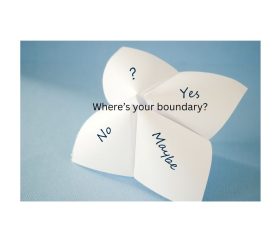Boundaries
What do we mean when we say boundaries?
We have boundaries everywhere: personal, work, home, in public, to name a few, and sometimes these boundaries overlap. Sometimes we are not aware of a boundary until someone crosses it and then we have to consider what that means to us and anyone else involved.
Let’s consider an example to explore possible boundaries and what could happen if that boundary is crossed. Here’s a scenario:
Supposing our accommodation is shared accommodation where ‘rules are agreed’ for instance no cooking after 11pm, we would need to consider what that ‘rule’ meant to our personal boundary and also to other housemates. If someone else is cooking after 11pm, how do we deal with that, what if they are using our pots and pans or ingredients, is that a violation of our financial boundary- after all we paid for those ingredients. And what if they don’t clean our pots and pans after use? Is this a violation of our hygiene boundary? And that’s without even considering the actual boundary (or rule- if you like) of the ‘no cooking after 11pm.
Knowing your boundaries means knowing what you will and will not put up with. But it’s not always that simple: some boundaries are fixed, others are flexible, and maybe in some areas there’s no boundary at all. And do we think of them as boundaries? An example of this could be supposing someone we are close to regularly borrows money, but usually asks, but this time they just took it (as they know where you keep a pot of emergency cash), is that ok with you? After all you would have lent it to them anyway? When considering boundaries, it’s good to explore where they lie, and what is the bottom line. And what are you going to do if that line is crossed? Can a fixed boundary become a flexible boundary? And what are the implications if it does? So now, a simple idea as boundaries has become a more complicated idea leading to questions and further dilemmas.
Let’s take the borrowing money scenario above as an example. Do you speak to the person about just taking the money without asking, or do you let it go this once? Speaking to them could lead to an argument, feeling of guilt, by either party, the person who took the money without asking may feel ashamed for doing so, or may get defensive. The person whose money it is may feel a little guilty for bringing up the subject, knowing that the other person is struggling, and not wanting them to feel ashamed by it, after all it could be seen as calling them a thief! You may decide to let it go, just this once. But having let it go ‘just this once’ are you setting up an unacknowledged agreement that it’s ok to take the money without asking- after all if you don’t approach it the first time, it must ok, isn’t it? This could lead to the money being taken whenever they want, without considering if you had plans for that money. Oh the dilemmas.
You see with boundaries, once you are aware of them, it’s only the beginning, how you enforce them, kindly and what you do with violations are the next BIG steps.
It’s worth bearing in mind that our initial reaction to a violation may not be the same reaction as a reflective reaction, so maybe a bit of time to consider what to do is advisable? We’ve all said things in the heat of the moment, only to regret then later. By the same token, a firmly fixed boundary, when crossed may warrant an immediate reaction.
It’s also worth remembering that other people’s boundaries may not be the same as ours. Have you ever heard anyone say “I wouldn’t put up with that!” I’ll bet you have at sometime or other! It’s easier said than done and until we are faced with the same situation, we don’t really know what we would do. However, it’s good to have an idea of what we would do………isn’t it?
Some boundaries are easier than other to put into practice, maybe the ‘not so important ones’. Also we could anticipate other people’s reactions to our boundaries if they are not used to them. People often resent change in others when it affects them, especially if they have something to gain from that person having flexible or no boundaries! Depending on the boundary, it’s worth remembering that most people are quite resourceful, and if you introduce a boundary and another person does not like it, they can usually find another way to get their needs met. An example of this is: supposing a person has a lift with you after work most days, but you’re not happy with this, as they expect you to take them straight to their front door, and you did this once as a favour, but now they expect it. If you decide to assert your boundary (time/money/travel) and inform that person that you can no longer take them home, they will find another way to get their needs met- ask someone else to take them, look into public transport etc. They may not like it, but you have the right to say no, and they’ll get over it, or if they don’t they were never a friend in the first place, just a colleague using you for a lift. Of course, there are grey areas that might be worth considering, such as offering them a life to the bottom of their road, if it’s on your way home, or something like that. When you look at it like that, it’s you can see clearer why you have the right to put in a boundary, and the right to assert it and that might mean changing something that another person may not like. It is not always easy to put in boundaries. All sorts of feelings and emotions come into it, but like anything, the more we practice the easier it gets. Having strong boundaries is assertive and people will learn to respect them and still like you. Of course, other people also have the right to assert their own boundaries and we might not like them at first!
Counselling can help you explore your boundaries and work on ways to implement them, help keep you motivated to maintain your boundaries and look at what might be holding you back from asserting them or maintaining them.


